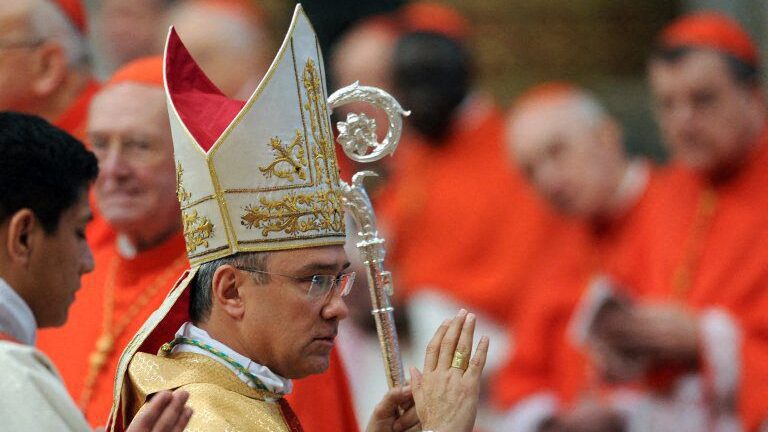
Photo: ALBERTO PIZZOLI / AFP
The Vatican faces a major scandal as details emerge around an attempted reversal of the clerical laicisation—’defrocking’—of Alberto Ariel Príncipi, a former priest convicted twice of child sexual abuse in Argentina.
Archbishop Edgar Peña Parra, the pope’s chief of staff, issued an order on 23rd September to reinstate Príncipi to ministry under restricted conditions. This decision effectively overturned two previous court rulings that removed the former cleric from the priesthood and downgraded his conviction to “recklessness.”
Yet, within weeks, the Dicastery for the Doctrine of the Faith (DDF), the Vatican office that manages the religious discipline and doctrine of the Catholic Church, blocked the order, leaving Vatican observers questioning who was behind the unusual decision and how high within the hierarchy the authorisation might go.
Príncipi’s conviction began with investigations in Argentina in 2021, after allegations surfaced involving minors. His case went through two legal reviews, with both an inter-diocesan court in Córdoba and an appellate tribunal in Buenos Aires convicting him on charges of child sexual abuse.
By April 2024, the DDF had upheld these rulings, leading to his definitive removal from the priesthood. However, by mid-year, a coalition of bishops from Argentina petitioned the Vatican, presenting new “evidence” supporting Príncipi’s reinstatement. In July the Secretariat of State initiated an “extraordinary procedure” to reconsider Príncipi’s case, bypassing the DDF and, reportedly, Pope Francis.
Peña Parra’s order directed that Príncipi’s conviction be overturned. Two days after the public announcement, however, Archbishop John Joseph Kennedy, head of the DDF’s disciplinary section, responded by declaring the move canonically void. Kennedy stated that the case remained under the jurisdiction of the DDF and that no appeal had been made through the required legal channels. The DDF’s swift intervention shows an internal conflict over authority and procedure, and puts in question Peña Parra’s power to attempt such a reversal.
The Vatican’s Secretary for Legislative Texts, Archbishop Filippo Iannone, offered comments that alluded to the Príncipi case without addressing it by name. He noted that while the Secretariat of State could convey decisions reached by legally competent bodies, it was not authorised to issue verdicts on clerical abuse cases independently. Iannone’s remarks raised doubts about whether the extraordinary procedure was merely an informal effort orchestrated by some senior figures or an officially sanctioned intervention.
The failed reinstatement attempt has drawn speculation that Argentine bishops, potentially influenced by personal or pastoral connections, had appealed directly to Peña Parra or even to Pope Francis himself. Writing for The Pillar, canon lawyer Ed Condon says several scenarios now seem possible. One theory suggests that Peña Parra acted autonomously after the bishops’ plea, interpreting his mandate to support papal staff as an avenue to intervene in Príncipi’s case. Another theory is that the pope, informed by his Argentine bishops or aides, instructed Peña Parra to review the matter discreetly, although no direct link to Francis has been confirmed. A third option is that Peña Parra’s actions, independent of papal input, sought to address the bishops’ concerns directly, sidelining the DDF’s established authority.
The controversy holds deep implications. Peña Parra’s order represented an attempt to bypass the Church’s legal process, which Francis himself has publicly endorsed. The outcome has been an unusual public rebuke of Peña Parra, whose position as papal chief of staff is highly influential. Typically, such internal disputes would not surface so visibly, especially concerning issues as grave as child abuse, highlighting the gravity of the attempted reversal.
If the pope implicitly backed Kennedy’s decision, it could suggest his approval of the DDF’s intervention and a strong stance against unauthorised interference. However, if Peña Parra continues in his role without repercussions, critics may interpret this as tacit support for his controversial actions.
Regardless, the Príncipi affair underscores the Vatican’s internal tensions regarding clerical misconduct. For a pope who has called for accountability in the handling of abuse cases, the Príncipi case presents a test of his principles. The affair could reshape the power dynamics within the Vatican, with significant implications for Pope Francis’ remaining pontificate.
As observers continue to scrutinise the Vatican’s response, the ultimate question remains: how far up the Vatican hierarchy did the push for Príncipi’s reinstatement extend, and what consequences will it bring?
